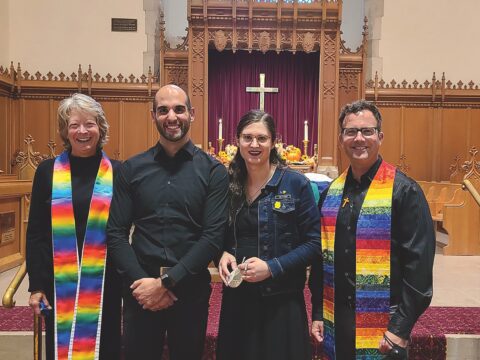Q: I am seeing a number of my colleagues in ministry across the United Church having their hours cut to part time from full time as their churches decline. Can congregations just decide to do that unilaterally?
A: The short answer is no, they can’t. Nor can it be agreed to just between the minister and the congregation. If this is being proposed, it must be approved by those in the regional council tasked with pastoral relations.
You may unsubscribe from any of our newsletters at any time.
Cutting hours is deemed a “change in the pastoral relationship.” That means it’s a fundamental shift in the nature of the work, one that requires a whole new job description and a new understanding of expectations for all involved. You don’t get full-time productivity for part-time pay.
And yet, cutting hours seems to be a growing trend. Rev. Ross Bartlett, adjunct professor at the Atlantic School of Theology, is investigating the move to part-time and bi-vocational ministry in the United Church. His research shows that by 2030, 40 percent of all calls in our denomination will be part time.
This is a huge shift and one that, I think, will only increase as the generation currently supporting congregations with their time and donations ages out.
This growing reality raises a whole raft of issues around our understanding of ministry and the church. It has implications for how we train future clergy, what church is going to look like and whether the United Church commits to helping ordered ministers who want full-time work to find it. These are complex issues without easy answers.
***
Rev. Christopher White is a minister at Kedron United in Oshawa, Ont.
This column first appeared in Broadview’s March 2022 issue with the title “Making ministry part time.”














As a retired United Church minister who worked full-time, this issue is uppermost in my mind at this time. From my seat in the pew currently, reflecting on the times from the viewpoint of the lay people in the church, I participate now with the split agenda. Having studied theology, and holding an M. Div. Degree, I see the concern of the minister’s full-time salary from two angles: one part of the issue involves the nature of ministry, and the other part involves the practical aspect of the salary. Unfortunately, the people who pay the salaries are not often the same people who are concerned with the nature of ministry. The reality of the situation means that the people who pay the salary need to focus on the practical aspect of the issue.
Biblically speaking it’s a two way street. Unfortunately it can turn into a one-way street.
It is the congregation’s responsibility to remunerate their minister. (1 Timothy 5:17; Galatians 6:6 and 1 Corinthians 9)
On the other hand it is the minister’s responsibility to “feed the sheep”, with the right motives. ( 1 Peter5:2-3; 1 Timothy 3:1-16; 2 Timothy 4:2)
“Feeding the sheep” involves discipleship; if we don’t motivate our congregation to do anything, they won’t. Sadly it requires a lot of work and example, but there is a “payoff” and not just monetary.
To the congregation, if God has blessed you by attending your church, why are you not blessing your pastor with the gifts (monetary and physical) God has given you? In the grand scheme of things, God has given us eternal life, so why are we so tight fisted with the temporal things?